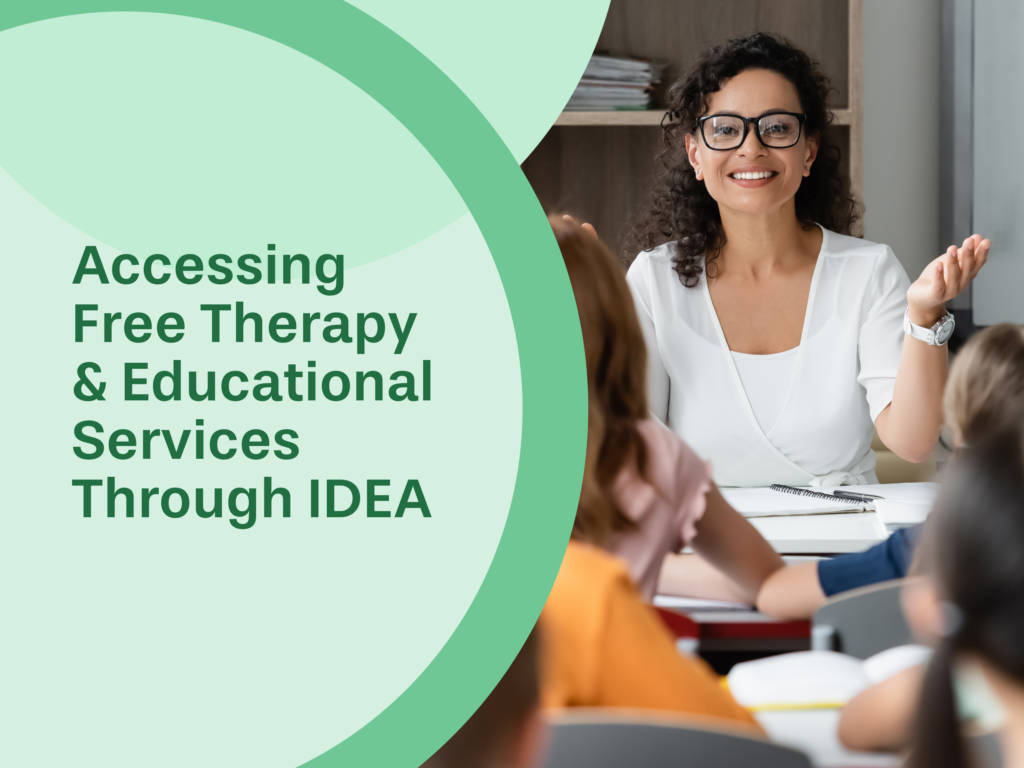A How-To Guide for Parents
As parents, we want what is best for our children. We watch our children and look for ways to support them. If we have concerns about their development or grade-level academic achievement, we might feel that speech, occupational, or physical therapy, counseling, or special education services would be beneficial. However, many parents are unsure of how to access free programs that may help. This article provides an overview of the Individuals with Disabilities Education Act (IDEA) as well as a general overview of steps to take to access Child Find and Special Education programs.
IDEA is a federal law passed in 1975 that provides programs and special education services for children with disabilities from birth through age 21.
IDEA ensures that children with disabilities receive:
- “free and appropriate public education” (FAPE)
- in the “least restrictive environment” (LRE)
- and that the education program is designed to meet their needs
Child Find, a provision of IDEA, helps to identify children who have a delay in development. If a parent or guardian has concerns about their child’s growth or learning, a Child Find screening and/or evaluation can be requested. In addition, doctors or other medical professionals may recommend that a parent pursue Child Find. The Child Find team will assess how the child plays, speaks, moves, behaves and participates in self-care skills. If a significant delay is found, early intervention services for children under 3 or special education services for children 3 or older will be offered at no cost to families. All children who are not currently enrolled in the public school system, such as those who are not yet in kindergarten or those enrolled in private schools, home-schooled, or migrant children can ask for their child to be assessed. Child Find offices are housed in each local school district.
Special Education services are educational services for children enrolled in public schools that are designed to meet the unique needs of students with disabilities while working to ensure that the children are included in the general education curriculum and activities alongside their peers as appropriate. Special education services may include specialized teaching, speech and language therapy, or related services like occupational or physical therapy, counseling, assistive technology, or transportation services to name a few. Parents or guardians can talk with their teacher or school administrator about concerns that they have to access special education services. Likewise, the school staff will monitor student progress throughout the year and may reach out to parents if they have concerns.
Typical steps followed when assessing for and implementing services through IDEA:
1. Contact the School/Parent:
If parents have concerns about their child, they should contact the school to make them aware and find out information about the process for accessing services. By the same token, the school will reach out to the parents if they have concerns about a child’s school performance.
2. Request an Evaluation:
If the parent would like their child formally evaluated through the school system, they should submit a written request. In the case that the school has noted concerns, written parental consent will be obtained prior to completing any formal evaluation. However, in some cases, the schools may initiate a Multi-Tiered System of Support that provides some additional interventions and support for a child prior to initiating the formal evaluation process for special education.
When parents give consent for the evaluation, they will receive a procedural safeguards document that outlines specific timelines and procedures that the school district must follow. This document is very important and should be reviewed by parents. The procedural safeguards are intended to ensure that parents are informed and involved and have transparency and accountability in the special education process.
3. Evaluation:
The child will be evaluated by different school professionals depending on their identified areas of concern. The examiners may include a school psychologist, speech language pathologist, audiologist, social worker, occupational therapist, physical therapist or other professionals. A written report of all evaluation results will be compiled
4. Eligibility Determination:
Once the evaluation is completed, a meeting with the parents and the evaluators will be scheduled. The evaluators will review their finds. The team will look at the eligibility IDEA criteria to determine if the student will qualify as a student with a disability. It is important to note that these are considered educational disabilities and not formal medical conditions or disabilities. Some of the disability categories include autism spectrum disorder, intellectual disability, specific learning disability, speech or language disability, emotional disturbance, visual or hearing impairment.
Of note, if a student does not meet the criteria of a student with a disability under IDEA but does have a documented medical condition that requires accommodations, they can qualify for some services under a 504 plan. Check out this article for more information.
5. Developing an Individualized Education Program:
If the child is found to be eligible, the team will develop an individualized plan that will outline specific goals, accommodations, and services that the child will receive. For children under 3, an Individualized Family Service Plan (IFSP) is developed. For children 3 or over, an individualized educational program (IEP) is created.
Parents are encouraged to participate in the development of this plan. It is important to note that special education services must be academically related and may not address areas of need that are not school-based. For more of a description of medical versus educational therapy, check out this article.
6. Implementation of Services:
Once the individual plan has been developed, the parents must give consent to implement the services. Services may be provided in a variety of settings including at home, in a classroom setting, an individual or group session outside of the classroom, or in a specialized educational setting. Services will be provided as outlined in the IFSP/IEP. Progress reports should be provided at regular intervals just like report cards are.
7. Review Meetings:
The individualized plans are reviewed at minimum on an annual basis. However, if any team member including parents would like to discuss the child’s progress and update the plan, a meeting can be scheduled at any time. Every 3 years, the team will do a more thorough review and re-evaluation of the child’s performance and eligibility called a triennial review.
All students should have the opportunity to learn, grow, and contribute. Therapy services can help children achieve their goals.
References
IDEA: Individuals with Disabilities Education Act (nd). Individual with Disabilities Education Act. U.S. Department of Education. Retrieved from https://sites.ed.gov/idea/.


